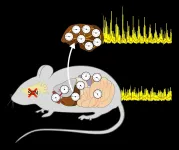(Press-News.org) Long black, espresso, or latte, whatever your coffee preference, drink too much and you could be in hot water, especially when it comes to heart health.
In a world first genetic study, researchers from the Australian Centre for Precision Health at the University of South Australia found that that long-term, heavy coffee consumption - six or more cups a day - can increase the amount of lipids (fats) in your blood to significantly heighten your risk of cardiovascular disease (CVD).
Importantly, this correlation is both positive and dose-dependent, meaning that the more coffee you drink, the greater the risk of CVD.
It's a bitter pill, especially for lovers of coffee, but according to UniSA researcher, Professor Elina Hyppönen, it's one we must swallow if we want keep our hearts healthy.
"There's certainly a lot of scientific debate about the pros and cons of coffee, but while it may seem like we're going over old ground, it's essential to fully understand how one of the world's most widely consumed drinks can impact our health," Prof Hyppönen says.
"In this study we looked at genetic and phenotypic associations between coffee intake and plasma lipid profiles - the cholesterols and fats in your blood - finding causal evidence that habitual coffee consumption contributes to an adverse lipid profile which can increase your risk of heart disease.
"High levels of blood lipids are a known risk factor for heart disease, and interestingly, as coffee beans contain a very potent cholesterol-elevating compound (cafestol), it was valuable to examine them together.
"Cafestol is mainly present in unfiltered brews, such as French press, Turkish and Greek coffees, but it's also in espressos, which is the base for most barista-made coffees, including lattes and cappuccinos.
"There is no, or very little cafestol in filtered and instant coffee, so with respect to effects on lipids, those are good coffee choices.
"The implications of this study are potentially broad-reaching. In my opinion it is especially important for people with high cholesterol or who are worried about getting heart disease to carefully choose what type of coffee they drink.
"Importantly, the coffee-lipid association is dose-dependent - the more you drink unfiltered coffee the more it raises your blood lipids, putting you at greater risk of heart disease."
Globally, an estimated 3 billion cups of coffee are consumed every day. Cardiovascular diseases are the number one cause of death globally, taking an estimated 17.9 million lives each year.
The study used data from 362,571 UK Biobank participants, aged 37-73 years, using a triangulation of phenotypic and genetic approaches to conduct comprehensive analyses.
While the jury still may be out on the health impacts of coffee, Prof Hyppönen says it is always wise to choose filtered coffee when possible and be wary of overindulging, especially when it comes to a stimulant such as coffee.
"With coffee being close to the heart for many people, it's always going to be a controversial subject," Prof Hyppönen says.
"Our research shows, excess coffee is clearly not good for cardiovascular health, which certainly has implications for those already at risk.
"Of course, unless we know otherwise, the well-worn adage usually fares well - everything in moderation - when it comes to health, this is generally good advice."
INFORMATION:
Media contact: Annabel Mansfield T: +61 8 8302 0351 M: +61 417 717 504
E: Annabel.Mansfield@unisa.edu.au
Researcher: Prof Elina Hyppönen E: Elina.Hypponen@unisa.edu.au
PITTSBURGH--"The Queen's Gambit," the recent TV mini-series about a chess master, may have stirred increased interest in chess, but a word to the wise: social media talk about game-piece colors could lead to misunderstandings, at least for hate-speech detection software.
That's what a pair of Carnegie Mellon University researchers suspect happened to Antonio Radi?, or "agadmator," a Croatian chess player who hosts a popular YouTube channel. Last June, his account was blocked for "harmful and dangerous" content.
YouTube never provided an explanation and reinstated the channel within 24 hours, said Ashiqur R. KhudaBukhsh a project scientist in CMU's Language ...
PULLMAN, Wash. - People tend to listen to big talkers, whether they are women or men. Still, more women prefer not to use assertive language, according to a new study led by Washington State University economist Shanthi Manian.
The study, published in Management Science on Feb. 17, found that participants in an experiment more often followed advice when the people giving the advice used assertive "cheap talk," statements that cannot be verified as true. Examples of such statements are often found in job seeking cover letters, such as "I have extremely strong problem-solving ...
Updated results from the CORONADO study, analysing the outcomes of patients with diabetes admitted to hospital with COVID-19, shows that one in five patients die within 28 days while around half are discharged. The study is published in Diabetologia (the journal of the European Association for the Study of Diabetes [EASD]), and is by Professor Bertrand Cariou and Professor Samy Hadjadj, diabetologists at l'institut du thorax, University Hospital Nantes, INSERM, CNRS, and University of Nantes, France, and colleagues.
In May 2020, preliminary results from CORONADO (Coronavirus SARS-CoV-2 and Diabetes Outcomes), ...
The tuberculosis (TB) vaccine Bacillus Calmette-Guerin (BCG) could protect newborns against a variety of common infections, such as upper respiratory tract infections, chest infections and diarrhoea, according to a new study in The Lancet Infectious Diseases.
The research is the first of its kind to rigorously investigate the full range of illnesses BCG could protect infants against. It suggests that vaccinating all babies on the day of birth with BCG could reduce neonatal infections and death in areas with high infectious disease rates, potentially saving thousands of lives a year. The results also increase the possibility that the vaccine might be used to protect children and adults against ...
Circadian clocks, which regulate the metabolic functions of all living beings over a period of about 24 hours, are one of the most fundamental biological mechanisms. In humans, their disruption is the cause of many metabolic diseases such as diabetes or serious liver diseases. Although scientists have been studying this mechanism for many years, little is known about how it works. Thanks to an observation tool based on bioluminescence, a research team from the University of Geneva (UNIGE) were able to demonstrate that cells that compose a particular organ can be in-phase, even in the absence of the central brain clock or of ...
LA JOLLA--(February 17, 2021) In structural biology, some molecules are so unusual they can only be captured with a unique set of tools. That's precisely how a multi-institutional research team led by Salk scientists defined how antibodies can recognize a compound called phosphohistidine--a highly unstable molecule that has been found to play a central role in some forms of cancer, such as liver and breast cancer and neuroblastoma.
These insights not only set up the researchers for more advanced studies on phosphohistidine and its potential role in cancer, but will also enable scientists ...
Deprive a mountain range of its wolves, and soon the burgeoning deer population will strip its slopes bare. "I now suspect that just as a deer herd lives in mortal fear of its wolves, so does a mountain live in mortal fear of its deer," wrote ecologist Aldo Leopold in his landmark 1949 title "A Sand County Almanac."
Leopold proposed that predators keep herbivore populations in check to the benefit of an ecosystem's plant life. Remove one link in the food chain, and the effects cascade down its length. The idea of a trophic cascade has since become a mainstay in conservation ecology, with sea urchins as a prime example just off the California ...
Rapid global urbanization has dramatically changed the face of our planet, polluting our atmosphere with greenhouse gases and causing global warming. It is the need of the hour to control our activities and find more sustainable alternatives to preserve what remains of our planet for the generations to come.
Carbon dioxide (CO2) and carbon monoxide (CO) make up a large proportion of industrial flue gases. Recent research has shown that certain microorganisms are capable of metabolizing these gases into useful by-products. Thus, attempts are now being directed to ...
BOSTON - Delirium, a common syndrome among older adults, particularly in those who have recently undergone surgery, critically ill patients in the ICU, and in older patients with multiple health issues, is a form of acute confusion that is characterized by poor attention, disorientation, impaired memory, delusions, and abrupt changes in mood and behavior. Moreover, patients who experience delirium are at increased risk of long term cognitive decline. Recently, clinicians and scientists have recognized that delirium is one of the first signs of COVID-19 infection in older patients and that it occurs frequently in patients with severe COVID-19 disease.
In a new study led by an interdisciplinary team of gerontologists, geriatricians, precision medicine ...
Dogs are generally considered the first domesticated animal, while its ancestor is generally considered to be the wolf, but where the Australian dingo fits into this framework is still debated, according to a retired Penn State anthropologist.
"Indigenous Australians understood that there was something different about the dingoes and the colonial dogs," said Pat Shipman, retired adjunct professor of anthropology, Penn State. "They really are, I think, different animals. They react differently to humans. A lot of genetic and behavioral work has been done with wolves, dogs and dingoes. Dingoes come out somewhere ...




